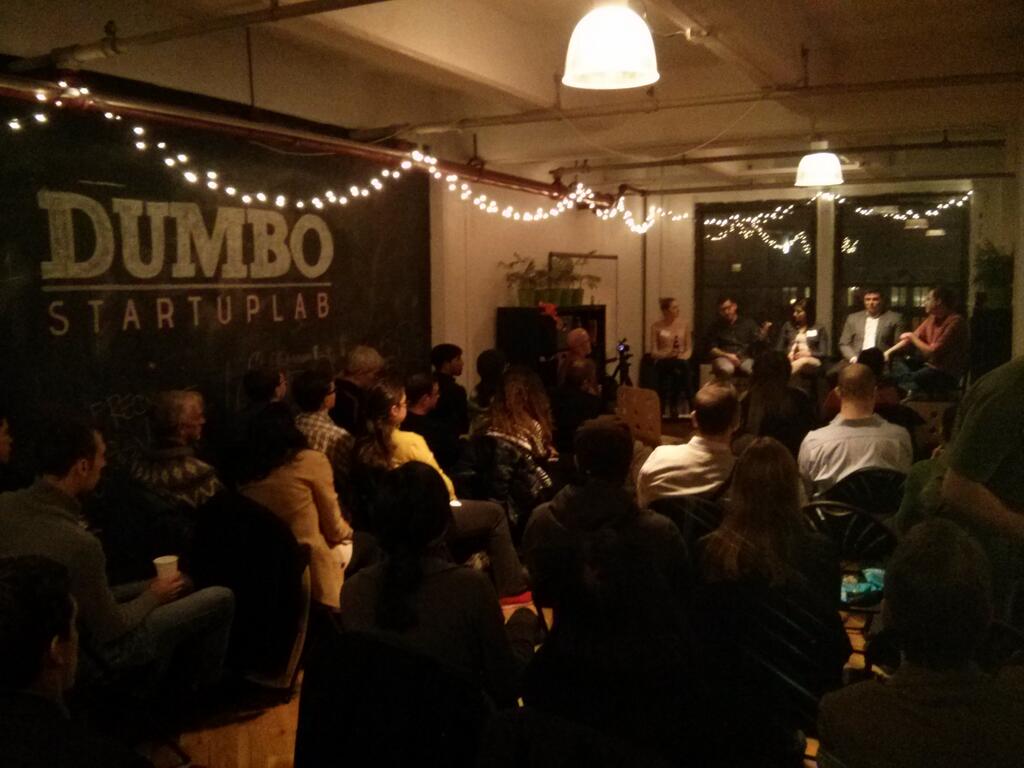For entrepreneurs, the choice between Manhattan and Brooklyn isn’t just one about cheaper rents anymore. Because, when it comes right down to it, in Dumbo, downtown and its environs, the difference isn’t as clear as it once was.
The two founders on the forum at Technical.ly’s roundtable discussion on “The State of Brooklyn Startups,” held this past Wednesday, both pointed out that Dumbo in particular, is not that competitive to Manhattan in terms of cost per square foot for commercial space. Now, it’s a question of what community you want to join, where your staff want to live and what customers you want to be close to.
The question of commercial real estate in the borough was a central theme in the conversation about Brooklyn’s early-stage tech business class, which featured Tucker Reed, the Executive Director of the Downtown Brooklyn Partnership; Tanya Mendez, Cofounder and COO at Makers’ Row; Nick Chirls an investor at Betaworks and Christina Mercando, Founder and CEO at Ringly. Held at the DUMBO Startup Lab, the conversation was moderated by Technical.ly Brooklyn editor Christopher Wink.
Some takeaways from the night:
- The biggest challenge for company growth is space. The problem is obvious, said Reed: when commercial spaces in desirable Brooklyn neighborhoods can top $40 a square foot, but residential is surpassing $60 a square foot, developers will choose the latter “every time.” Tax incentives and other government influence needs to push mixed-use development because the market won’t bear it. Mendez
- Tech scene competition. Comparing Brooklyn to Manhattan and New York to Silicon Valley was a big topic for the night. Mercando pointed out that in San Francisco you don’t have to explain what you mean if you say you work at a startup, but you still often do have to here. Overall, there seemed to be a sense that Brooklyn is a strong anchor to a growing New York-wide tech ecosystem.
- Brooklyn’s Economic Growth. Reed spoke to the progress Brooklyn has made and the positive indications from Brooklyn’s political leadership to find ways to make it even easier for technology and creative ventures to get off the ground. For example, in 2004, downtown Brooklyn has 300 ‘innovation firms’ and now boasts more than 500. Today, there are 10,000 jobs in the sector, and Reed’s group estimates the number will double by 2020.
- Brooklyn is a brand. It’s a mantra that Chirls mentioned a series of times in his belief that the borough can and should find its own strengths. Those who use the brand should do so with the right intentions.
- The maker ecosystem. While cautioning not to make too much of the importance of hyperproximity to Makers’ Row staff, Mendez, who is building a platform to connect with American manufacturers, said that the fact that they have factories they can get feedback from in their same building and on their same block has been really powerful for developing their product with the customer in mind.
- On choosing locations, Mercando, whose Ringly is a pre-launch wearable tech jewelry company, said, “Every company has to decide what the tradeoffs are. We’re a hardware company, so we need a lot of space. We do like that more industrial feel that you get here, but I also have so many meetings in the city.”
- Manhattan meetings. The challenge of taking meetings with investors in Manhattan is one argument for locating there. Both Mendez and Mercando said they burn a lot of times on trains. That said, Chirls countered that “VCs aren’t such suits” that they can’t ever be persuaded to come to Brooklyn. In all, Mendez said there is a feeling of the two boroughs being farther than they, despite a quick train ride.
- VC limits. In response to the question of whether a burgeoning tech scene might ever stretch VCs too thin, Chirls said there is plenty of VC money out there. The money follows good, scalable businesses, he said. But, as Reed put the group, with access to Manhattan, does it matter that Brooklyn itself isn’t silly with early-stage capital?
- Changing funding context. Another questioner asked about the importance of the JOBS Act, legislation that will allow non-accredited investors to buy a part of startups. Chirls said it was so important that he was in the midst of pivoting within Betaworks to launch a company inside of it to build the tools to facilitate this kind of investing.
- John Coghlan, owner of the DUMBO Startup Lab, observed during the Q&A that you see a strong thread through Brooklyn’s strongest tech firms — MakerBot, Etsy and Kickstarter — that one way or another they are broadening the possibilities of individuals and small groups of creatives. Is that, he asked, the borough distinction we’re looking for?
About 40 people came out for the event. The next event Technical.ly has on its Brooklyn calendar is the #NotAtSXSW party and design show, at the IFP Made In NY Media Center, March 13, 7 pm.







